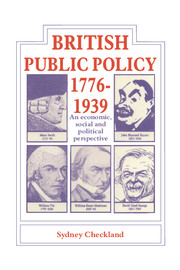Book contents
- Frontmatter
- Contents
- Preface
- Introduction
- Part I Industrialisation and war, 1776–1815
- Part II Assimilating the industrial revolution, 1815–51
- Part III The Victorian apogee, 1851–74
- Part IV Industrial maturity and the ending of pre-eminence, 1874–1914
- Part V Total war and troubled peace, 1914–39
- 14 The policy imperatives of war; the reconstruction debate and the dismantlement of control, 1914–21
- 15 The strains of nationalism: Wales, Scotland and Ireland
- 16 The advent of peacetime macro-economic management
- 17 Micro-management: the restructuring of industry and agriculture; the regions
- 18 Micro-management: the public sector
- 19 The business response
- 20 The political and industrial attitudes of labour
- 21 The welfare share: its elements and adequacy
- 22 Public policy by 1939
- Bibliography
- Index
16 - The advent of peacetime macro-economic management
Published online by Cambridge University Press: 05 August 2012
- Frontmatter
- Contents
- Preface
- Introduction
- Part I Industrialisation and war, 1776–1815
- Part II Assimilating the industrial revolution, 1815–51
- Part III The Victorian apogee, 1851–74
- Part IV Industrial maturity and the ending of pre-eminence, 1874–1914
- Part V Total war and troubled peace, 1914–39
- 14 The policy imperatives of war; the reconstruction debate and the dismantlement of control, 1914–21
- 15 The strains of nationalism: Wales, Scotland and Ireland
- 16 The advent of peacetime macro-economic management
- 17 Micro-management: the restructuring of industry and agriculture; the regions
- 18 Micro-management: the public sector
- 19 The business response
- 20 The political and industrial attitudes of labour
- 21 The welfare share: its elements and adequacy
- 22 Public policy by 1939
- Bibliography
- Index
Summary
The shift in values and in power
Post-war Britain was a country much changed, bewildering to its rulers, themselves formed in an age which, for all its stresses, had been one in which the appearance at least of a basic continuity had been maintained.
With the old landed families in decline, new men of wealth and power asserted themselves. They were the creators and products of the age of monopoly already apparent before the war, and of the war itself with its immense government contracts and unprecedented finance. A good number of such men had been drawn directly into the war effort as ministers, departmental heads or advisers. They were now almost a new estate of the realm, the custodians of the arcana of big business. There was some inclination among Conservative politicians to think that they should also be in control of public economic affairs. Their outlook was, of course, very different from that of the former mentors of society, the landed class. The minds of the latter had largely been formed by the agricultural estates over which they had presided; their outlook had its roots in the land, its crops and animals and men. The new business men, especially the most powerful among them, the financiers, were often remote from this kind of psyche-building life, being concerned with estimates about the course of markets, or, very often, estimates about the estimates and actions of others.
- Type
- Chapter
- Information
- British and Public Policy 1776–1939An Economic, Social and Political Perspective, pp. 282 - 311Publisher: Cambridge University PressPrint publication year: 1983



